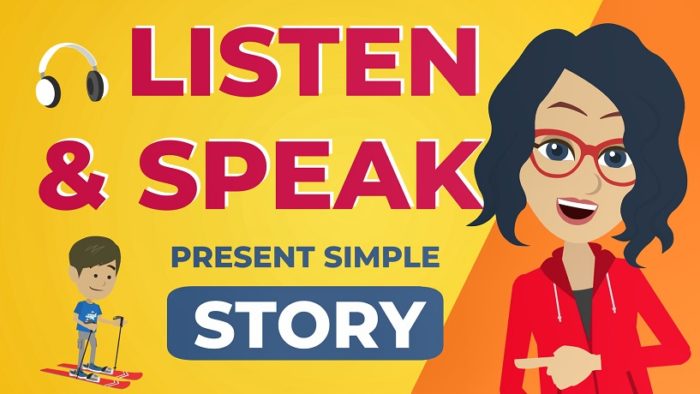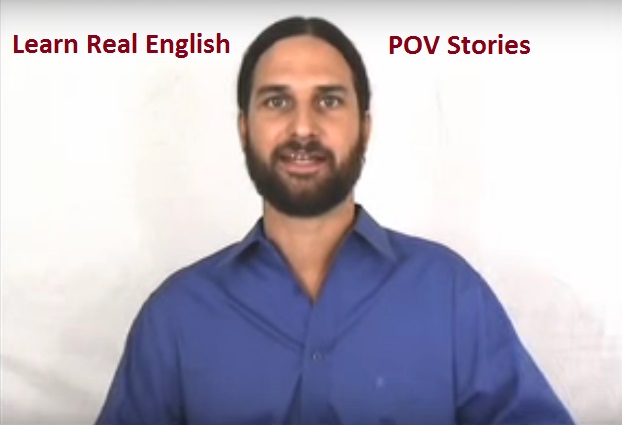English present simple story listening & speaking
If you want to use correct grammar when you speak English, you should practice grammar rules repeatedly. For example, after you learned the English present simple story, you should read and listen to a lot of sentences in this particular tense. Now you can use short stories to use that grammar automatically when you speak.
Short stories are perfect to practise English listening and speaking. You can use English grammar correctly and automatically by listening to the English present simple story. You can download our short stories from our home page English Easy Practice.
In order to speak English fluently, you must practice grammar and vocabulary repeatedly so that you can use them automatically. That is where the short stories come in. Just listen to our English stories and answer the easy questions out loud.
In this story, we used a lot of simple present tense sentences. So you will hear many present simple examples to exercise. There are positive sentences, negative sentences, questions, and answers. Our English Easy Practice course is very powerful to improve English listening skills and speaking skills.
These are very useful short stories for kids as well. Repetition is very important to speak English. So repeat that story with simple present tense exercises and you will become fluent eventually.
English present simple story video for listening and speaking
Visit our Youtube channel for more videos
Hello. Welcome to the Relax English practicing story #3. Now you are going to listen to the story. Then I will ask many questions about it. You must answer every question. Use your pause button and answer the question. Then play again. You can answer with just one word or two words. It’s okay. Short answers are okay. Let’s get started:
I am a student. I get up early every morning. I go to school every weekday. I have lots of books. I love reading so much. My father is a constructor. He builds houses. He usually goes to work by car but he sometimes walks. My mother is a teacher. She teaches mathematics in the school. She likes music and she very often plays piano.
My sister Julia works very hard. She starts at 7.30 and finishes at 8 o’clock in the evening. She is very clever. She speaks four languages. She speaks English, German, Spanish and Chinese. The weather here is always cold. It sometimes rains. But it often snows. We live in a small town. We go to skiing every weekend. We like it so much.
Okay, back to the beginning with questions:
I am a student. I get up early every morning.
Am I a teacher?
No, I am not. I am not a teacher. I am a student.
Do I get up late?
No, I don’t. I don’t get up late. I get up early.
How often do I get up early?
Every morning. I get up early every morning.
Do I get up late every morning?
No, I don’t. I don’t get up late every morning. I get up early every morning.
Do I get up early sometimes?
No, I don’t. I don’t get up early sometimes. I always get up early in the morning.
I go to school every weekday.

Do I go to school every weekend?
No, I don’t. I don’t go to school at weekend. I go to school every weekday.
Do I go to the cinema every weekday?
No, I don’t. I don’t go to the cinema every weekday. I go to school every weekday.
What do I do every weekday?
Go to school. I go to school every weekday.
How often do I go to school?
Every weekday. I go to school every weekday.
I have lots of books. I love reading so much.
Do I love to read books?
Yes, I do. I love to read books. I love reading.
Do I hate reading?
No, I don’t. I don’t hate reading. I love it so much.
My father is a constructor. He builds houses.
Is my father a musician?
No, he isn’t. He is not a musician. He is a constructor.
What does he do?
He builds houses. He is a constructor.
Does he destroy houses?
No, he doesn’t. He doesn’t destroy houses. He builds houses.
Does he build cats?
No, he doesn’t. He doesn’t build cats. He builds houses.
How does he go to work?
He usually goes to work by car but he sometimes walks.
Does he go to work by vessel?
No, he doesn’t. He doesn’t go to work by vessel. He goes to work by car.
As you can see, there are lots of simple present tense sentences in this story. So you can practice English grammar by listening to the short story and answering the easy questions out loud.
Download The English Easy Practice Full Course
You don’t need to wait for cargo. Our lessons are downloadable. After you download the course, you can easily put all of your lessons on your phone or mp3 player and take them wherever you go. To the gym, on your morning run, in the bus, in the car, anywhere.
Why are stories powerful? Stories are ancient. (Ancient means very very old) for thousands of years, humans learned through stories. Before writing, people learned history, science, and religion with stories.
Reason number 1: stories are very easy to remember. Stories give context to information. Context means a natural situation a connection. In other words, the information in a story is connected. For example, new vocabulary is connected to the characters, the action, the images in the story. You don’t learn the new word alone. You learn the new English word connected to the story. When you think of the new word you can imagine the part of the story it is connected to. So you remember new English vocabulary much faster when you learn it from a story. The same is true with English grammar and pronunciation.
Reason 2: Stories are naturally emotional. Even a simple story has some emotion. Stories can be funny, scary, surprising, frustrating, happy. And when we connect emotion to information, we learn English faster and we remember it longer. So if you want to learn English fast and speak it fluently, you should use short stories for learning English.
Reason 3: Stories are more interesting and enjoyable. Because stories have emotion, characters, conflict (that means fighting or struggle or difficulty) they are naturally interesting to us. Obviously, it is much more fun to listen to a story than to study a textbook. Because it’s more fun you want to do it more often and for a longer time. With stories you listen longer and more often, learn faster, remember longer and enjoy it more. That’s why listening to stories is the best way to learn English.
What You Get Today When You Buy Now
- 20 Story Lessons For Listening and Speaking
- 20 Slow Versions of the story lessons
- 20 Pdf script text of the lessons (over 140 pages total)
- + Bonus Lessons For Listening & Speaking Practice
Related Posts
-
 English Simple Past Tense Story Listen and Speak
2 Comments | Jun 18, 2021
English Simple Past Tense Story Listen and Speak
2 Comments | Jun 18, 2021 -
 LRE Rule 5: Point of View Stories To Learn Grammar
1 Comment | Mar 21, 2016
LRE Rule 5: Point of View Stories To Learn Grammar
1 Comment | Mar 21, 2016 -
 Daily English Conversation Practice
No Comments | Jul 30, 2022
Daily English Conversation Practice
No Comments | Jul 30, 2022 -
 Daily English Conversations for Listening Practice
No Comments | Jun 4, 2022
Daily English Conversations for Listening Practice
No Comments | Jun 4, 2022


It’s very useful, just need to keep following you regularly.
Thanks.
Mohammad
That’s good to hear it, Mohammad. Keep following Good luck 🙂